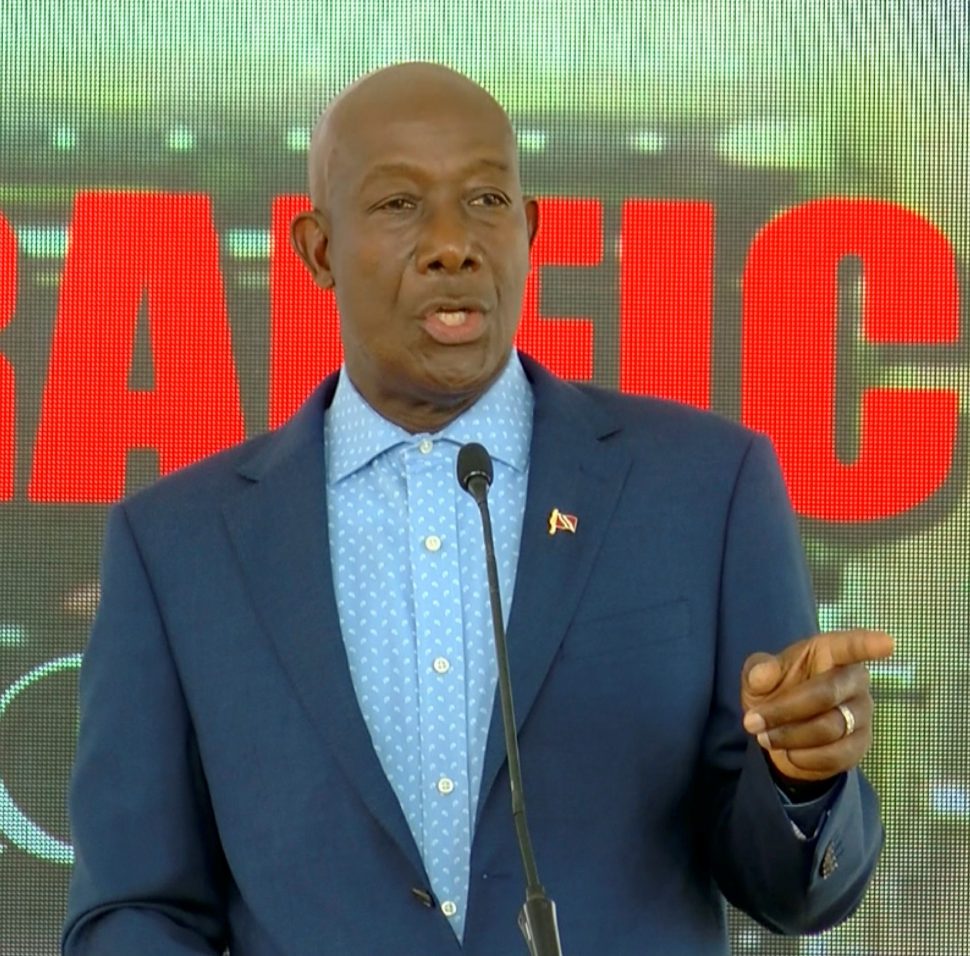(Trinidad Guardian) Prime Minister Dr Keith Rowley slammed the US State Department for T&T’s ranking in their 2019 Trafficking in Persons Report which placed the country at Tier 2.
He accused the US of hypocrisy, given their own struggles with migrants. He was speaking at the opening ceremony for the last leg of phase one of the Chaguanas Traffic Alleviation Project on Friday.
“If I was marking their paper, what would I give them? They have the same problem that we have. Thousands of migrants rushing your border wanting to come into your country because they see greener grass on your side than on their side. That is the number one political issue in America.”
Rowley continued, “…their own people are telling you that those people, some of them are treated like dogs and cattle, children are dying at the border. Some of them are in cages. A hundred people in a room that was made for ten.”
He cited the fact that the US is better resourced than T&T with a larger military and treasury but asks: “…how have they handled their situation better than ours?”
Rowley explained that T&T maintained an open border with Venezuela up until Monday, allowing the migrants to come into the country for up to 90 days before returning to their country. A new visa policy went into effect but the details have not yet been made public.
The Prime Minister drew reference to the recently completed two-week registration of the Venezuelan migrants saying that we have treated them in the best way possible.
“A little Caribbean nation like Trinidad and Tobago, we have 15,000 Venezuelans authorised now to be within our borders and we treat them like human beings within Trinidad and Tobago.”
“We get an ‘F’. Well God alone knows what we have to do to get an ‘A’. Maybe we have to put a placard in the middle of Caracas saying ‘Come to Trinidad, land of milk and honey’,” he said in what appeared to be a direct response to an Express newspaper report that this country had been given an ‘F’ grade on the Trafficking in Persons report.
He told the members of the audience not to feel beaten by countries who grade us with an ‘F’ because “we have done more than other countries to manage migrations into their borders.”
He said that “we mark our own paper. This Trinidad and Tobago stands on its own strength, our own principles…”
In the report, the US recognised that there was increased anti-trafficking training for its officials with investigations launched against three potentially complicit officials.
They also took note that a new intelligence task force was started to improve investigations, while a new memorandum of understanding between its children’s authority and an anti-trafficking unit was put in place to better protect child victims.
However, the US also noted the T&T Government had not secured a conviction under its 2011 anti-trafficking law while concern over reports of potential government complicity in trafficking cases was met with insufficient government attention.
But while the Prime Minister appeared unduly upset at the State Department report, his National Security Minister Stuart Young did not appear to have as many concerns or reservations.
Young issued a statement explaining that the annual US State Department report “acknowledges the various measures taken by the Government to improve this country’s counter-trafficking efforts.”
This country he said continued to work “assiduously” to counter human trafficking and as a result of its overall increasing efforts, T&T had maintained its tier two ranking.
The Trafficking in Persons Report 2019, Young said, recognised that this country had increased anti-trafficking training for public officials; initiated investigations against three potentially complicit officials; initiated more prosecutions; established a new intelligence task force to improve investigations; and established a new Memorandum of Understanding between Government’s Counter Trafficking Unit (CTU) and The Children’s Authority to better protect child victims.
Young said the Ministry was “cognisant of the recommendations” made in the report specific to T&T with regard to expanding victim screening and victim services, increasing training on trafficking for Non-Governmental Organisations (NGOs) and shelter staff, and further increasing efforts to investigate, prosecute, and convict traffickers, including complicit officials.
Members of the public who have information on suspected human trafficking activity should contact the Counter Trafficking Unit (CTU) toll-free hotline at 800-4288 (4CTU).






